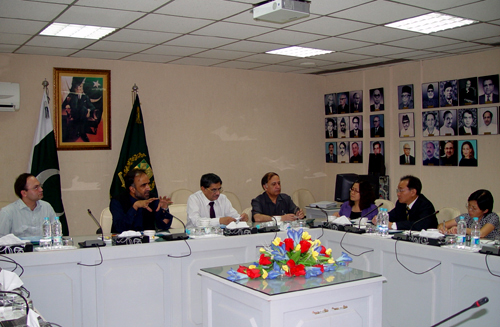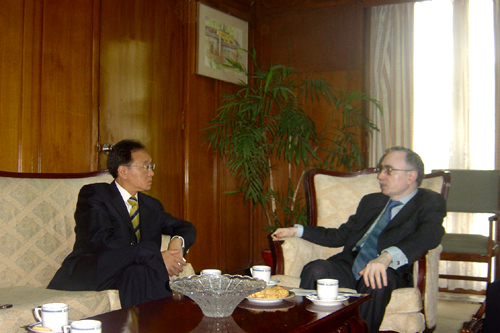By Chen Qiuping
Because of terrorist havens near the Afghan border and the long-standing Kashmir issue, Pakistan is often considered to be politically unstable. But is this almost universal impression accurate, or is it, as Pakistan people claim, a serious misinterpretation? What is really going on inside the country?
A joint media delegation from Beijing Review and China.org.cn recently visited Pakistan and talked to government officials and the media organizations in Islamabad to get their points of view concerning terrorism, Pakistan-India relations and Pakistan-China relations.
"A national effort to root out terrorism"
Over the past several decades, Pakistan has faced challenges from fundamentalists, extremists and terrorists, according to Qamar Zaman Kaira, Pakistan's federal minister for information and broadcasting.
 |
|
Qamar Zaman Kaira (2nd left), Pakistan's federal minister for information and broadcasting, talks to the visiting Chinese media delegation headed by Beijing Review President and Editor in Chief Wang Gangyi (2nd right). [Pan Shuangqin/Beijing Review]
|
Pakistani authorities are struggling to confront the Pakistani Taliban and tribal militias in the Federal Administered Tribal Areas (FATA). Because tribes often live on both sides of the border between Pakistan and Afghanistan, and militants know the terrain very well, it is relatively easy for them to evade government forces.
"We want stability and peace in this region. If you allow these elements to grow, ignore them, not only will they cause instability and disturbance in the country, but also, external powers will take advantage of their presence. So I think we're moving ahead," said Masood Khalid, Pakistan's additional foreign secretary with responsibility for the Asia-Pacific region.
 |
|
Masood Khalid (right), Pakistan's additional foreign secretary with responsibility for the Asia-Pacific region, gives an interview to the visiting Chinese media delegation headed by Beijing Review President and Editor in Chief Wang Gangyi. [Chen Qiuping/china.org.cn]
|
The Pakistan Army has had some recent successes in confronting Taliban-backed extremists in the Swat Valley region of the Northwest Frontier Prov¬ince and is now focused on replicating those advances in the Tribal Areas.
On the other hand, the Pakistani government has also been signing peace agreements with tribal leaders. "We have to avoid using force against ordinary people who are basically nationalist and patriotic but have been misled. Otherwise it will create alienation and more problems," said Khalid. It is a constant struggle, but the Pakistani government is trying to gradually change the extremist mindset through negotiations.
"I think the solution to the problems is social and economic development," said the additional foreign secretary.
Reconstruction is under way to meet the daily needs of people living in the area. The Zardari government, according to recent local media reports, has worked out a five-year plan for social development and economic revival in the Malakand Division of the North-West Frontier. According to the plan, the government will undertake massive reconstruction of damaged property and will ensure the rebuilding of homes for every displaced person in Malakand.
"It's in Pakistan's own interests and also a national effort to root out terrorism," said Khalid firmly.